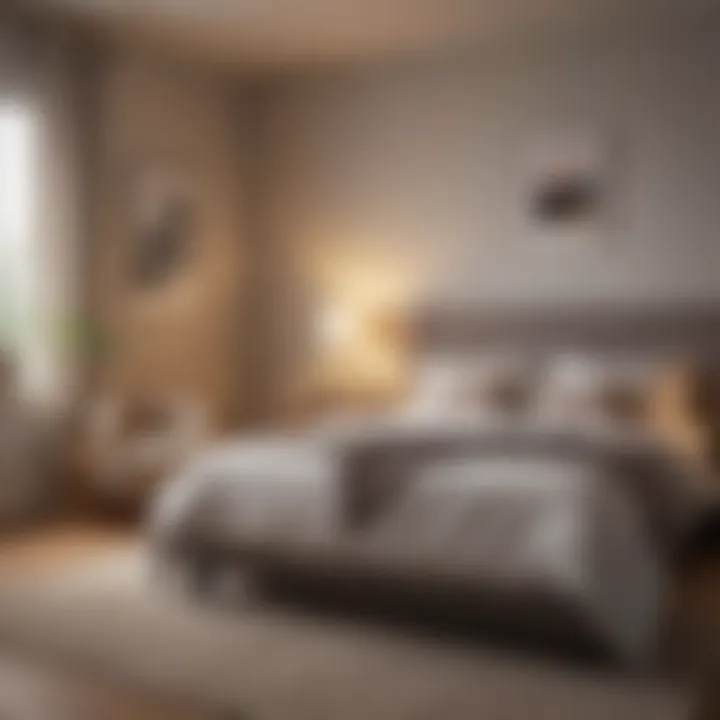Understanding Nighttime Anxiety: Causes and Solutions


Research Overview
Prologue to the topic under study
Nighttime anxiety is a phenomenon many experience yet few understand. Unlike daytime anxiety, which can manifest with clear triggers, anxiety that strikes at night often comes without warning. This condition can lead to fragmented sleep, making it difficult to unwind and relax after a busy day. Understanding its intricacies is crucial for those affected.
Summary of existing research findings
Research indicates that nighttime anxiety can result from a mix of physiological and psychological factors. Studies, like those published in the Journal of Clinical Sleep Medicine, reveal connections between stress hormones and sleep disturbances. Other studies suggest that cognitive patterns, such as negative thought cycles, can exacerbate feelings of anxiety at night.
Key research methodology explained
Much of the existing research has relied on surveys and sleep diaries to collect qualitative and quantitative data. Sleep studies monitoring brain activity during anxiety episodes have also contributed to a better understanding of this challenge. Some research utilizes self-reported anxiety scales alongside physiological monitoring to glean insights about how individuals experience nighttime anxiety.
Health Implications
Discussion on the impact of the research on health
Understanding nighttime anxiety is essential, as it impacts both mental and physical health. Studies have shown that those who frequently wake up feeling anxious often experience increased levels of stress hormones, which can lead to chronic conditions such as hypertension and depression. Furthermore, disrupted sleep patterns can impair cognitive function and emotional regulation.
Exploration of potential benefits and risks
Effective management of nighttime anxiety can lead to significant increases in overall well-being. For instance, individuals may experience improved sleep quality, better concentration during the day, and reduced anxiety symptoms. However, over-reliance on sleep medications can pose risks, such as dependency or undesirable side effects. Avoiding medications and focusing on lifestyle changes can be more beneficial in the long run.
Examples of how the findings can be applied in daily life
Utilizing findings from research allows for practical applications. For instance, adopting a regular bedtime routine can signal the body to prepare for sleep. Engaging in mindfulness practices, such as meditation or yoga, has also shown promise in reducing nighttime anxiety. These methods can help stabilize stress levels and improve sleep quality, fostering a healthier lifestyle.
Well-being Strategies
Practical tips and strategies derived from the research
Based on current research, there are several strategies an individual can implement:
- Maintain a sleep diary to track anxiety triggers.
- Establish a calming pre-sleep routine.
- Reduce caffeine and sugar intake in the evening.
- Practice relaxation techniques, like deep breathing.
Advice on implementing positive changes for well-being
Integrating these strategies requires commitment. Start small; for instance, designate 10 minutes before bed for a mindfulness exercise. Gradually increase this time. Additionally, consider discussing sleep issues with a healthcare provider to explore further options.
Personal stories or case studies supporting the strategies
One individual reported doing breathing exercises nightly, which significantly reduced their feelings of anxiety. Another case involves keeping a consistent bedtime, allowing the mind and body to synchronize their sleep cycles more effectively. Such experiences validate the effectiveness of simple yet practical changes when dealing with nighttime anxiety.
Expert Insights
Analysis of expert opinions on the research findings
Numerous psychologists emphasize the need for a multi-faceted approach. Dr. Jane Smith, a sleep expert, states that combining therapy with lifestyle modifications often yields the best results. Cognitive-Behavioral Therapy (CBT) addresses both anxiety and sleep issues, creating an effective path toward recovery.
Q&A session with a relevant expert on the topic
Q: What is the most common cause of nighttime anxiety?
A: The most common triggers include unresolved stress, lifestyle changes, and even certain medications that alter sleep patterns. Identifying these triggers is crucial for effective management.
Preamble to Nighttime Anxiety
Nighttime anxiety is a significant concern that affects many individuals across various demographics. Understanding this issue is crucial for anyone seeking to enhance their mental and emotional well-being. Nighttime anxiety can disrupt sleep cycles, leaving individuals feeling fatigued and overwhelmed during the day. Addressing this topic helps to shed light on the underlying causes, the physiological and psychological implications, and the effective coping strategies that can alleviate the distress.
Defining Nighttime Anxiety
Nighttime anxiety can be described as a heightened state of worry or fear that specifically occurs during the night. This form of anxiety often manifests through racing thoughts, feelings of dread, or an overwhelming sense of restlessness. It can occur at any stage of sleep or while trying to fall asleep. Many people experience this sensation as they lie in bed, making it difficult to relax. It can lead to frequent awakenings and increased difficulty in returning to sleep. The causes of nighttime anxiety may vary, frequently linked to a combination of external stressors and internal psychological conditions.
Prevalence and Demographics of Nighttime Anxiety
The prevalence of nighttime anxiety is more common than one might expect. Studies suggest that a considerable percentage of the population suffers from some form of nighttime anxiety. Research shows up to 40% of adults experience significant anxiety during nighttime hours, impacting their overall life quality.
Demographically, nighttime anxiety does not discriminate; it can affect individuals from different ages, backgrounds, and circumstances. However, specific groups may be more susceptible. For instance, adolescents and young adults often experience heightened anxiety due to various life changes and pressures. Additionally, individuals with pre-existing mental health conditions, such as generalized anxiety disorder or PTSD, are at a higher risk of encountering nighttime anxiety. Understanding the demographics of nighttime anxiety helps in tailoring specific strategies to combat this concern effectively.
"Nighttime anxiety can feel isolating, but recognizing its prevalence can be the first step toward addressing it."
This knowledge is crucial for developing effective coping mechanisms and seeking appropriate help when necessary.
Physiological Factors Contributing to Nighttime Anxiety
Understanding the physiological factors behind nighttime anxiety is essential for anyone experiencing such disturbances. Physical health and mental states are interlinked. When our body undergoes stress or changes, the mind can also react in unexpected ways. With anxiety, particularly at night, it can lead to disrupted sleep and a cycle of worry that may feel overwhelming.


The Role of Stress Hormones
One significant contributor to nighttime anxiety is the release of stress hormones, particularly cortisol and adrenaline. These hormones are typically released in response to stress, influencing various bodily functions. High levels of cortisol can affect how well we sleep. When a person is anxious, their body may go into a heightened state of alertness. This "fight or flight" response can result in increased heart rate and elevated blood pressure, making it difficult to relax or drift into sleep. Understanding how prolonged stress sends signals to the body can help individuals manage their anxiety more effectively.
Neurotransmitter Imbalances
Another important factor involves neurotransmitters, which are chemicals that facilitate communication between nerve cells. Imbalances in these substances can cause emotional disturbances. For example, serotonin and gamma-aminobutyric acid (GABA) play crucial roles in regulating mood and anxiety. When levels of serotonin are low, an individual might feel increased anxiety, making it challenging to unwind at night. Likewise, diminished GABA activity diminishes the body's ability to decrease brain excitability, possibly leading to feelings of unrest during the night. Understanding these imbalances offers insight into addressing nighttime anxiety through potential adjustment of lifestyle or diet.
Sleep Cycle Disruptions
Moreover, the disruptions in sleep cycles also play a significant role in nighttime anxiety. The natural progression through different sleep stages is crucial for restorative sleep. If an individual frequently experiences interruptions, such as waking suddenly, it can lead to fragmented sleep. This disordered sleep cycle can amplify feelings of anxiety and stress during waking hours, creating a perpetuating cycle that substantially affects daily life. Each fragmentation during sleep may cause a heightened sense of anxiety, underscoring the importance of maintaining a consistent and restful sleep environment.
"Understanding these physiological underpinnings can be the first step for those struggling with nighttime anxiety in identifying their triggers and taking control of their health."
By recognizing the interplay of hormones, neurotransmitters, and sleep patterns, individuals can better understand their nighttime anxiety. This knowledge lays the groundwork to explore effective coping strategies and potential interventions.
Psychological Aspects of Nighttime Anxiety
Nighttime anxiety is not merely a physiological issue; it deeply intertwines with psychological factors. It is essential to explore these aspects to fully understand the experience of waking up anxiously at night. Psychological components encompass cognitive patterns, emotional responses, and underlying conditions affecting an individual's mental state. Understanding these details is key in identifying effective strategies for managing nighttime anxiety.
Cognitive Patterns and Catastrophizing
Cognitive patterns play a significant role in nighttime anxiety. Many individuals suffering from this condition often engage in irrational thoughts or cognitive distortions. Catastrophizing is common, where one imagines the worst possible outcomes of a situation. For instance, a simple thought about an upcoming work presentation can balloon into fears about job security or public humiliation. These thoughts often emerge in the quiet of the night, when distractions are minimal, making them more potent and hard to dismiss.
To combat this cognitive pattern, individuals can benefit from recognizing these thoughts as they occur. Keeping a thought journal can help track such patterns, allowing for more conscious awareness. Cognitive Behavioral Therapy (CBT) is also effective in shifting these destructive thinking patterns into more rational thought processes, providing individuals with tools to reshape their perspectives.
Impact of Life Events and Stressors
Life events and stressors can also trigger nighttime anxiety. Major events like job loss, relationship issues, or even small stressors accumulated over time contribute to overarching anxiety levels. When night falls, the mind may reflect on unresolved issues, potentially leading to anxiety. Without daytime distractions, worries can re-emerge, feeling magnified.
It's crucial to address these stressors proactively. Recognizing recurring themes in stress allows for the development of personal coping strategies. Techniques such as journaling about one's feelings or discussing them in therapy provide healthy outlets. Additionally, establishing a winding down routine before bed can ease the mind and help segregate daytime worries from nighttime rest.
Underlying Mental Health Conditions
Certain mental health conditions can exacerbate nighttime anxiety. Disorders such as generalized anxiety disorder, depression, and post-traumatic stress disorder often influence how a person experiences anxiety. Individuals with anxiety disorders may find that their symptoms worsen at night, leading to higher levels of distress during sleep.
It is vital for those experiencing persistent nighttime anxiety to consider seeking professional help. Therapists can provide accurate diagnoses and recommend appropriate treatment options. Addressing underlying mental health conditions typically involves a combination of therapy and possibly medication. This comprehensive approach aids in alleviating not only nighttime anxiety but also overarching mental health concerns, paving the way for improved overall well-being.
"Addressing psychological aspects of nighttime anxiety is just as crucial as understanding physiological causes. This holistic view promotes a more effective management strategy."
In sum, recognizing the psychological elements of nighttime anxiety enhances understanding and helps formulate more effective coping strategies. Skills developed in therapy, alongside awareness of cognitive patterns and surrounding stressors, create a framework for managing this complex issue.
Symptoms of Nighttime Anxiety
Nighttime anxiety manifests in various ways, deeply affecting both sleep quality and overall well-being. Understanding these symptoms is crucial, as they are the first indicators for many individuals that their mental health needs attention. Symptoms can be categorized into physical, emotional, and behavioral indicators, each revealing different aspects of the anxiety experience. Recognizing these signs enables more effective management strategies and helps individuals identify when professional help is needed.
Physical Symptoms Experienced
Physical symptoms of nighttime anxiety can be significant. Many people report heightened physiological responses, such as an increased heart rate, sweating, or trembling. These symptoms often occur when an individual is trying to settle down for the night, leading to a cycle of fear and restlessness.
Other common physical manifestations include:
- Muscle tension: Many experience tightness in shoulders and neck, which can lead to discomfort over time.
- Gastrointestinal disturbances: Anxiety may cause stomach issues, including nausea or a sense of unease.
- Sleep disturbances: This encompasses trouble falling asleep or frequent awakenings during the night, which compounds the feeling of anxiety.
"Recognizing physical symptoms early can help individuals initiate coping mechanisms before anxiety escalates."
These physical symptoms can exacerbate feelings of anxiety, leading to a negative feedback loop that further disrupts sleep and mental health.
Emotional Symptoms and Reactions
Emotional symptoms are equally critical to understand in the context of nighttime anxiety. Feelings of dread or impending doom often surface during the night, trapping individuals in a cycle of worry. This emotional turmoil can include:
- Irritability: Increased tension and inability to manage stressful situations may arise during the day.
- Persistent fear: Worrying excessively about the future or unresolved issues can hinder relaxation.
- Feelings of hopelessness: The ongoing struggle with nighttime anxiety may lead individuals to feel overwhelmed or helpless.
Emotional reactions can trigger further physical symptoms, making it essential for individuals to learn how to address these feelings effectively.
Behavioral Indicators of Distress
Behavioral indicators are actions that demonstrate the impact of nighttime anxiety on an individual’s daily life. Individuals often change their routines or habits in response to anxiety symptoms, which can lead to more significant challenges. These indicators include:
- Avoidance behaviors: Some may avoid sleep altogether or change sleep environments in an effort to find peace.
- Substance use: Turning to alcohol, caffeine, or other substances to cope can lead to detrimental health impacts.
- Increased dependency on routines: Routines may become rigid as individuals seek to control their anxiety, ultimately leading to further distress when disruptions occur.
Understanding these behavioral signs is vital. They usually indicate the severity of the anxiety and can guide individuals toward the appropriate self-help strategies or professional resources needed to regain control over their sleep and health.
Impacts of Nighttime Anxiety on Health


Nighttime anxiety has significant implications for overall health. Understanding these impacts is important for those who experience disrupted sleep due to anxious thoughts. This section will detail how nighttime anxiety can influence physical and mental health, emphasizing the necessity for effective coping mechanisms.
Effects on Physical Health
Nighttime anxiety can manifest in various physical symptoms, which may complicate existing health issues or even lead to new concerns. Common physical effects include:
- Increased heart rate: Anxiety often leads to heightened heart rate, increasing cardiovascular strain. This stress can contribute to long-term heart issues.
- Muscle tension: Constant anxiety during the night often results in muscle tightness. Over time, this can lead to chronic pain.
- Weakened immune response: Prolonged anxiety impacts immune function, making individuals more susceptible to illness.
These effects highlight the need for attention to both mental and physical components of health. Addressing nighttime anxiety can lead to improved physical health outcomes.
Impact on Mental Well-Being
The relationship between nighttime anxiety and mental well-being is profound. Anxiety during the night can foster a range of emotional challenges, including:
- Increased irritability and mood swings: Sleep disruption causes fatigue, leading to lower patience thresholds.
- Heightened feelings of hopelessness: Experiencing nightly anxiety can create a negative feedback loop, where fear of sleep becomes linked to the anxiety itself.
- Depression: Chronic anxiety is often correlated with higher rates of depression, which affects overall quality of life.
Addressing nighttime anxiety can help mitigate these impacts on mental health, potentially enhancing overall emotional resilience.
Long-Term Consequences of Disturbed Sleep
The long-term effects of unresolved nighttime anxiety are concerning. A consistent lack of quality sleep linked to anxiety can lead to:
- Cognitive decline: Sleep disruptions can impair cognitive functions, affecting memory and decision-making abilities over time.
- Chronic health conditions: Conditions such as diabetes, hypertension, and obesity can be exacerbated by poor sleep quality.
- Deterioration of social relationships: Increased irritability and emotional instability may strain personal connections and social interactions.
These consequences underline the importance of addressing nighttime anxiety effectively. More than just a nighttime issue, it impacts multiple facets of life.
Coping Strategies for Managing Nighttime Anxiety
Managing nighttime anxiety is crucial for restoring a sense of peace and improving sleep quality. Individuals grappling with this form of anxiety must seek ways to cope effectively. Different strategies can lessen the sense of unease that often accompanies those restless nights. This section will explore three main approaches that can protect mental well-being during the night: lifestyle adjustments, cognitive behavioral techniques, and relaxation and mindfulness practices.
Lifestyle Adjustments
Making conscious lifestyle adjustments can significantly help in managing nighttime anxiety. Such changes may lead to better sleep patterns and decreased anxiety levels.
- Sleep Hygiene: Establishing a consistent bedtime routine is essential. Going to bed and waking up at the same time daily can create a healthier sleep cycle. Reducing screen time before bed can also be beneficial, as blue light from devices may inhibit the production of melatonin.
- Dietary Choices: What one eats throughout the day can influence anxiety levels. Caffeine and sugar, particularly in the afternoon or evening, can heighten anxiety and disrupt sleep. Emphasizing a balanced diet with adequate hydration will support both physical and mental health.
- Physical Activity: Regular exercise can help alleviate anxiety symptoms. Engaging in physical activities promotes the release of endorphins, which are natural mood lifters. However, it’s important to avoid vigorous workouts close to bedtime to prevent increased alertness.
These adjustments pave the way for improved sleep quality and can create a more conducive environment for relaxation, setting the stage for a better experience at night.
Cognitive Behavioral Techniques
Cognitive Behavioral Techniques (CBT) are effective for addressing nighttime anxiety. CBT focuses on identifying and changing negative thought patterns that trigger anxiety.
- Challenging Negative Thoughts: Learning to recognize anxious thoughts that arise at night can lead to significant improvement. Keeping a journal near your bedside to jot down these thoughts can be helpful. This practice can prevent them from molding the mindset just before sleep.
- Reframing: Once negative thoughts are identified, reframing them into more positive or realistic perspectives is critical. Instead of thinking "I won't be able to sleep," one could say "I can manage restlessness if it happens."
- Exposure Therapy: Gradually exposing oneself to anxiety-provoking scenarios in a controlled manner can also help reduce sensitivity to these situations over time. This technique empowers individuals by showing them that they can cope with discomfort.
By implementing these cognitive techniques, individuals can reshape their night-time mental landscape, leading to reduced anxiety when trying to sleep.
Relaxation and Mindfulness Practices
Integrating relaxation and mindfulness practices into one’s routine can offer profound benefits for managing nighttime anxiety. These methods emphasize living in the moment and fostering a calm environment.
- Breathing Exercises: Simple deep breathing exercises can be effective in calming the nervous system. Focusing on slow, controlled breaths helps to lower heart rates and bring attention away from anxious thoughts.
- Meditation: Mindfulness meditation encourages a non-judgmental awareness of thoughts and feelings. Practicing this before bed can help clear the mind and reduce pre-sleep anxiety.
- Progressive Muscle Relaxation: This technique involves tensing and relaxing different muscle groups. It can help release tension held in the body, promoting relaxation.
"Mindfulness practices can help bring a sense of peace even during the most intense moments of anxiety."
Incorporating these relaxation strategies into a nightly routine can enhance the overall experience of winding down for the day. It not only improves sleep quality but also fosters a better mindset for facing the day ahead.
Therapeutic Interventions for Nighttime Anxiety
Therapeutic interventions for nighttime anxiety play a critical role in managing anxiety and restoring healthy sleep patterns. This section delves into various strategies used in therapy, medication, and emerging treatments. Each approach offers distinct avenues for alleviating anxiety symptoms. Exploring these options can provide individuals with tailored solutions, helping them regain control over their nighttime experiences.
Role of Therapy and Counseling
Therapy and counseling are essential components in addressing nighttime anxiety. Professional therapists specialize in various methodologies geared towards reducing anxiety. Cognitive Behavioral Therapy (CBT) is particularly effective. It helps individuals identify and challenge negative thought patterns contributing to their nighttime distress.
In sessions, patients can express their feelings related to anxiety and its impact on their ability to sleep. Techniques such as exposure therapy may also be utilized, enabling individuals to confront their anxiety in a safe environment. This progressive approach can desensitize them to anxiety-provoking stimuli, which may lead to reduced feelings of distress at night.
Benefits of therapy include:
- Developing a personalized coping strategy.
- Improving sleep hygiene practices.
- Fostering a greater understanding of triggers.
Therapists can guide individuals to feedback from these sessions, transforming learned strategies into actionable steps.
Medication Options
Medication can be an effective support for individuals struggling with nighttime anxiety. Various pharmaceutical options exist, each with its specific considerations and benefits.


Common classes of medications include:
- Anxiolytics: These are used to relieve anxiety symptoms quickly. Drugs like diazepam may provide immediate effects.
- Antidepressants: Certain antidepressants like sertraline can alleviate anxiety while also boosting mood. They may take longer to demonstrate effects.
- Sleep Aids: Prescription medications like zolpidem can assist those who struggle with sleep initiation due to anxiety.
It is crucial for individuals to consult healthcare professionals before starting any medication. Professional guidance ensures proper identification of specific needs and potential side effects.
Emerging Treatments and Research
Research into nighttime anxiety is ongoing, with new treatments continuously emerging. Investigating novel therapies and alternative approaches is vital for those seeking innovative solutions. Recent studies have shown promise in using:
- Mindfulness-Based Stress Reduction (MBSR): This technique emphasizes mindfulness practice and meditation, resulting in decreased anxiety.
- Virtual Reality Therapy (VRT): Exposure to simulated scenarios can help individuals confront their fears in a controlled setting.
- Neurofeedback: This technique aims at training brain activity to regulate emotional responses.
Advancements in technology and psychotherapy methods contribute positively to strategies for combatting nighttime anxiety. Individuals are encouraged to stay informed about new options and explore recommendations for further support.
Understanding therapeutic interventions is vital for those affected by nighttime anxiety. These methods provide pathways to relief that can significantly enhance sleep quality and overall well-being.
Self-Help Resources and Tools
Self-help resources and tools are essential components for understanding and managing nighttime anxiety. These tools empower individuals to take charge of their mental health and develop coping mechanisms. They facilitate awareness, provide valuable information, and create a support system that can be instrumental in the journey toward better sleep and reduced anxiety.
Books and Online Materials
Books and online materials serve as foundational resources for individuals dealing with nighttime anxiety. They offer knowledge and strategies for self-management. Among the well-regarded publications, titles such as "The Anxiety and Phobia Workbook" by Edmund J. Bourne or "The Sleep Book: How to Sleep Well Every Night" by Guy Meadows focus on practical techniques for addressing anxiety and improving sleep quality.
Online platforms like websites and blogs also provide insights. Many reputable mental health organizations publish articles on their websites, delivering advice on coping strategies and understanding anxiety. Utilizing these resources enables readers to find scientifically-backed information, which is critical for informed decision-making about their mental health.
Apps for Mental Health Support
In our digital age, specific applications aimed at mental health can be a significant asset for managing nighttime anxiety. These apps, such as Headspace or Calm, offer guided meditations, relaxation exercises, and sleep aids that cater directly to anxious feelings.
The convenience of accessing these resources on smartphones allows individuals to practice techniques anytime and anywhere. Some apps even track sleep patterns, providing insights into how nightly routines affect anxiety levels. The integration of technology in mental health care enhances the personal management of anxiety.
Community Support Groups
Community support groups present another avenue for coping with nighttime anxiety. These groups facilitate open discussions among individuals who share similar experiences. Engaging with others can alleviate feelings of isolation that often accompany anxiety disorders.
Online forums like those found on Reddit or Facebook create virtual communities. They allow participants to seek advice, share stories, and lend support to one another. These communal experiences foster understanding and validation, which can be crucial for someone coping with nighttime anxiety. Additionally, local support groups offer face-to-face interactions, further enriching the experience of sharing and learning with peers.
"Isolation can exacerbate anxiety, and community support helps counteract this by promoting connectivity and mutual understanding."
While using these resources, it is important to remain mindful of their limitations. They serve as complementary strategies but should not replace professional advice when needed. By effectively leveraging self-help tools, individuals can enhance their understanding and management of nighttime anxiety.
When to Seek Professional Help
Recognizing when to seek professional help for nighttime anxiety is crucial for effective management. Many individuals may experience nighttime anxiety due to stress or temporary life events. However, when anxiety begins to disrupt sleep regularly or significantly impact daily functioning, professional help may be necessary. Understanding when to act is the first step to regaining control over one’s mental health.
Identifying Severity of Symptoms
The severity of symptoms can vary widely among individuals. Recognizing the signs that indicate a need for help is essential. Some common indicators include:
- Persistent anxiety that occurs several nights a week.
- Physical symptoms like rapid heartbeat or sweating that make it difficult to return to sleep.
- Reoccurring nightmares or feelings of dread during the night.
- Impairment in daily life, such as difficulty concentrating at work or school due to fatigue.
If any of these symptoms appear regularly, it’s likely time to consider seeking professional guidance. Addressing anxiety early can prevent further complications and promote better overall health.
Barriers to Seeking Help
Despite recognizing the need for help, many people face barriers that prevent them from seeking it. These can include:
- Stigma associated with mental health issues, leading to feelings of shame.
- Financial concerns regarding therapy costs or lack of insurance.
- Misunderstanding symptoms or uncertainty about whether they warrant professional help.
Overcoming these barriers is important. Society's perceptions of mental health are gradually changing, and finding support can often lead to valuable resources that make the journey easier.
Navigating the Healthcare System
Once the decision is made to seek help, navigating the healthcare system can seem daunting. Here are some essential steps to consider:
- Research options: Look for local providers or telehealth services specializing in anxiety treatment. Websites like Reddit can offer community feedback on professionals.
- Consult your primary care provider: They can provide recommendations and evaluate if your anxiety needs immediate attention.
- Verify insurance coverage: Understanding which services are covered can reduce unexpected costs.
- Prepare for your appointment: Keep a log of symptoms to discuss, helping the professional understand your situation better.
Taking these steps allows individuals to feel empowered in their path to better mental health. It may take time and patience, but support is available for those who seek it.
Epilogue
In the exploration of nighttime anxiety, it is important to recognize how deeply this condition intertwines with both mental and physical health. The insights gained throughout this article highlight key elements that individuals may find beneficial in their quest for understanding and alleviating anxiety that occurs during the night.
Understanding that nighttime anxiety not only disrupts sleep but also has cascading effects on overall wellness is crucial. Those suffering often report higher levels of stress, poorer physical health, and difficulties in maintaining mental clarity. The multifaceted nature of this topic suggests that a single solution may not suffice; rather, an integrated approach is often necessary.
Key strategies emerge from the discussion, including:
- Lifestyle Adjustments: Simple changes in daily routines can significantly mitigate anxiety levels. Regular exercise, balanced nutrition, and establishing a calming nighttime routine can help reduce anxiety triggers.
- Therapeutic Techniques: Cognitive Behavioral Therapy (CBT) is particularly effective for many. It encourages individuals to confront and reframe their anxious thoughts.
- Relaxation Practices: Techniques such as guided imagery, deep breathing exercises, and mindfulness meditation are valuable for promoting relaxation before bed.
Remember: Professional help should be sought if symptoms persist or worsen. Recognizing when to reach out is paramount in the management of nighttime anxiety.



